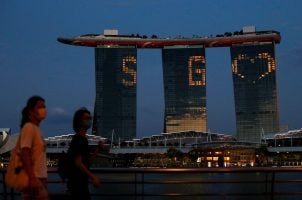Macau Recovery Depends on Mass Market, VIPs ‘Under Pressure,’ Says Credit Suisse
Posted on: September 22, 2020, 12:42h.
Last updated on: September 22, 2020, 02:00h.
Rebound hopes for Macau’s still ailing gaming industry lie squarely with mass market players, as tighter regulatory controls potentially crimp VIPs, according to Credit Suisse.

Beijing is cracking down on junkets and money transfer channels often used by high-end gamblers looking to move cash from the mainland to the gaming center and back again. Those efforts could hinder Macau’s aspirations for a post-coronavirus recovery while putting an unusually large burden on ordinary gamblers to move the needle.
This hurts big players demand, affects junket debt collection, and blocks funding channels for big players. According to the State Council Information Office, it could be a three-year campaign until 2022,” said Credit Suisse.
Concessionaires vulnerable to retrenchment in the high-end segment include Melco Resorts & Entertainment (NASDAQ:MLCO) and Wynn Resorts (NASDAQ:WYNN). While Melco, the operator of three Macau integrated resorts, is favored by some analysts, Credit Suisse feels differently.
On Monday, the bank lowered its rating on the name to “neutral” from “outperform,” while slashing its price target on the stock to $18.70 from $24. The moves sent Melco shares lower by 10 percent.
Mass Nice, VIPs Better
The VIP/mass market debate is a matter of simple math for concessionaires. Obviously, more affluent players gamble at higher limits, and many spend more on amenities, such as dining, entertainment, rooms, and shopping.
The simplicity of the math is already on display. Through the first three weeks of September, the average daily aggregate gross gaming revenue (GGR) posted by Macau concessionaires is $11.27 million, down 88 percent year-over-year, according to Bernstein. Last week, the total clocked in at $225.5 million, which is considered disappointing because visits to the special administrative region (SAR) increased.
Higher traffic and lower revenue is exactly the scenario operators are looking to avoid because it confirms the aforementioned thesis of Macau being reliant on VIPs to drive recovery.
“Without a healthy VIP junket system, casinos would lose one of the key sources to grow their premium mass players, as these players lost one of their major channels to move money (~30% of their gambling funds go through the VIP system),” according to Credit Suisse.
Looking for Winners
Under a scenario in which mass market revenue at least holds steady and lower-level players can bring modest upticks in turnover, some concessionaires could benefit.
Notably, Galaxy Entertainment and Las Vegas Sands (NYSE:LVS) hold dominant mass market share in Macau, a trait many analysts favor in the current environment. Sands owns five Macau integrated resorts, making it the largest operator on the peninsula.
Both companies have long been more levered to mass and premium mass players than to VIPs, indicating they’d be less vulnerable to a marked pullback in higher-tier spending than some of their rivals.
Related News Articles
MGM China Warns of Possible $30M Liability over Junket Holdings
Most Popular
Las Vegas Overstated F1 Race’s Vegas Impact — Report
Vegas Strip Clubs Wrestle in Court Over Animal Names
ESSAY: Remembering ‘The Beatles LOVE’ in My Daughter’s Eyes
Most Commented
-
End of the Line for Las Vegas Monorail
— April 5, 2024 — 90 Comments -
Mega Millions Reportedly Mulling Substantial Ticket Price Increase
— April 16, 2024 — 6 Comments -
Long Island Casino Opponents Love New York Licensing Delays
— March 27, 2024 — 5 Comments -
Nearly Abandoned Mall Outside Vegas Soon to Have Only One Tenant
— March 12, 2024 — 5 Comments
















No comments yet